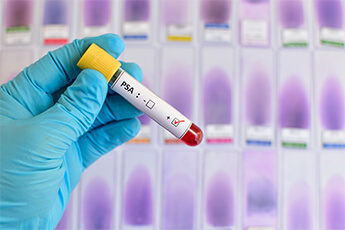4 tips for living with prostate cancer


More than 3 million American men are living with prostate cancer. For many of them, prostate cancer is a slow-growing disease. This means they’re unlikely to develop metastatic prostate cancer, and the prognosis is generally good. About 95% of men with prostate cancer are still alive 15 years after the initial diagnosis.
If you receive a prostate cancer diagnosis, you may wonder if there’s anything you can do to protect your health and lower the odds of the cancer returning or spreading. This may be especially true if you opt for active surveillance. With this approach, you only start prostate cancer treatments if tests indicate the cancer is growing. Or you may start treatment if you develop problematic symptoms like urinary incontinence or pain.
From the community: “… believe it or not, life will continue. It will change but it's only over if you let it. Follow the doctor's recommendation for testing. Use the time to research treatment options that are really available to you. There are treatments galore out there but some are very far away, some are too expensive and some will be too destructive to your lifestyle. I believe that all the treatments have side effects. Some are just immediate and some creep in later. Find out what your treatment options are. Do as much research into each one as you need to make the choice you can live with. See what each treatment is going to do to your current lifestyle. My radiation option was not going to work for me. I was building a business and 1 hour driving into Austin and then an hour back for 9 weeks daily was not going to work for me. I did the surgical route since it would have minimal impacts on me. Take the time to figure out what will really work the best for you and your other half. This cancer didn't start yesterday but months or maybe a year ago. A few weeks researching is not really going to change anything. But it will allow to make a good choice for YOU on your treatment. This choice is very personal and shouldn't be rushed in to. In my case, my life actually has improved…” – Inspire member
How can you live better with prostate cancer?
Whether you undergo treatments or opt for active surveillance, these tips can help you live healthier after a prostate cancer diagnosis.
eat a nutritious diet
fit in physical activity
manage side effects
seek help to quit smoking
Eat a nutritious diet
Research suggests that eating certain foods and avoiding others may slow the progression of prostate cancer. A healthy diet can also help you achieve and maintain a healthy weight. Carrying extra weight increases your chances of prostate cancer coming back after treatments (a cancer recurrence).
Recommended foods for improved prostate health include:
vegetables like Brussels sprouts, broccoli, carrots, sweet potatoes, mushrooms, and peppers
fresh fruits like berries, oranges, lemons, grapefruits, grapes, and pomegranates
cooked tomatoes like tomato sauce, stewed tomatoes, and tomato juice
cold-water fish like salmon, trout, and sardines
green tea and coffee
legumes, including beans, peas, lentils, peanuts, and flaxseed
Fit in physical activity
Exercise is good for your physical and mental health. And it may improve your prognosis. One study found that men with early-stage prostate cancer who walked briskly at least three hours each week lowered their risk of cancer progression and death by more than half compared to men who exercised for less than one hour per week.
If you’ve been sedentary, talk to your doctor first about how to safely start an exercise program. One way to ease into exercise is by aiming for 30 minutes of physical activity most days of the week. You can even break up the exercise into 10-minute segments three times a day.
From the community: “I have managed to regain some sexual function with the help of Cialis and the pump… While my prostate cancer is advanced and incurable, I will at least have some sexual function for a time. I thought that I could live without any sexual function, and had given up for awhile, but with modern medicine, we can finally have some sexual function in spite of the above-mentioned adversities. I certainly will have bouts of depression and despair, due to the nature of the illness and also the mood swing effects of the hormone therapy, but these are temporary, and I have to enjoy the good days, and bear in mind that the depressive episodes aren't going to last forever.” – Inspire member
Manage side effects
Both the disease of prostate cancer and its treatments can cause issues that affect your physical and mental health. Often, there is help for these problems — they’re not something you have to live with. For instance:
Urinary problems: Prostate cancer can cause the prostate to get bigger, affecting the bladder’s ability to empty urine. And certain cancer treatments can damage the nerves and muscles that help you control urine flow. You may develop a frequent urge to urinate, not be able to relieve yourself when you want to, have a weak urine stream, or find yourself leaking urine. These are all signs of urinary incontinence. Depending on the symptoms and underlying cause, your doctor may recommend pelvic floor exercises (Kegels), urinary pads, medications, or surgeries like a urethral sling or artificial sphincter.
Sexual dysfunction and intimacy issues: Research indicates that men with prostate cancer are more likely experience a drop in sexual desire, leading to less frequent sex than their peers who don’t have the disease. Other sexual problems like painful ejaculation and erectile dysfunction may occur. All of these factors can affect sexual intimacy. Certain medications, as well as individual and couples counseling, can help.
Depression and anxiety: The uncertainty of a cancer diagnosis combined with side effects makes men with prostate cancer more prone to mental health disorders like depression and anxiety. You may benefit from taking medications, speaking to a mental health counselor, and connecting with others through networks like Inspire’s Prostate Cancer Support Community.
From the community: “It is tough to manage the amount of leaking you describe. I know from personal experience, having had the same amount as you. Luckily, two months post surgery is still quite early and you can do some things that will help. I agree with the others that PT with a therapist who specializes in urinary incontinence and who focuses on exercises beyond kegels to strengthen the entire pelvic floor is important. Biofeedback can be part of this. Although it didn’t get me all the way dry, it reduced my leaking from 10 pads to two per day and that is a huge difference. In the meantime, there are some lifestyle things that may make things easier: Alcohol, especially beer, dramatically increased my leaking so I avoided it. Anything with caffeine increased my leaking. Spicy foods sometimes did. I experimented with all the different brands of pads to find the ones with enough capacity and that were shaped for comfort. I also changed my underwear style to a style that provides no room for pads to move around. This helps avoid leaks… Finally, after you have exhausted PT, you may want to consider clamps or one of the surgeries for incontinence but that is too soon for you for now.” – Inspire member
Seek help to quit smoking
Men with prostate cancer who use tobacco products have a 40% chance of a cancer recurrence. They’re also twice as likely to develop metastatic prostate cancer and die from the disease. In addition, current and former smokers are more likely to experience serious treatment side effects like urinary toxicity and urinary incontinence after undergoing radiation therapy.
Your doctor can prescribe effective smoking cessation tools like nicotine patches or medications like varenicline (Chantix®). You can also get help through national support programs like SmokeFree.gov and the American Lung Association’s Freedom From Smoking.
Sources
Does body weight affect cancer risk? American Cancer Society. June 2020.
Key statistics for prostate cancer. American Cancer Society. January 2021.
Living as a prostate cancer survivor. American Cancer Society. June 2020.
Azvolinsky A. Smokers have worse prostate cancer outcomes. Cancer Network. January 26, 2015.
Explaining the link between prostate cancer and obesity. Cedars-Sinai. September 2017.
3 ways exercise helps the prostate. Harvard Health Publishing. May 2014.
Prostate cancer prognosis. Johns Hopkins Medicine.
Five foods to protect your prostate. Prostate Cancer Foundation.
Hyun JS. Prostate cancer and sexual function. The World Journal of Men’s Health. August 2012.
Maintaining a healthy lifestyle. ZERO — The End of Prostate Cancer.
Disclaimer
Member comments are lightly edited for length and to remove identifying information but are otherwise reproduced as they appear in the community as part of public posts.
This content is for general informational purposes only and does not necessarily reflect the views and opinions of any organization or individual. The content should not be used as a substitute for professional medical advice, diagnosis, or treatment. Please consult your healthcare provider about any questions you may have regarding a medical condition.



